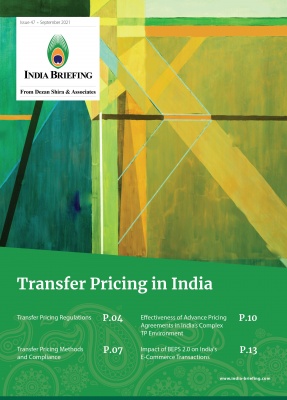
Transfer Pricing in India
Published: September 2021In light of the OECD’s Base Erosion and Profit Shifting (BEPS) program, India’s tax authorities are enforcing stricter local transfer pricing regulations as well as imposing detailed compliance requirements. Our latest edition of India Briefing magazine provides an overview of India’s transfer pricing regulations and discusses the accepted transfer pricing methods. We also cover the advance pricing agreement program and comment on its implementation in India. Lastly, we look at India’s alignment with the consensus around BEPS 2.0 and its impact on the taxation of e-commerce companies.
India opened up its economy in 1991 with the implementation of several reform policies encouraging foreign trade and foreign direct investment. This significantly increased transactions between the same group of companies and the transfer price between them began to impact the profits and losses of Indian companies. To address these concerns, India's tax authorities first introduced transfer pricing regulations (TPR) through the Finance Act, 2001, and made it effective from the financial year ending March 2002. These provisions were governed by the Income Tax Act, 1961, and based on the transfer pricing guidelines of the Organization for Economic Co-Operation and Development.
India’s transfer pricing laws are enumerated under sections 92 to 92F of the Indian Income Tax Act, 1961 and cover intra-group cross-border transactions. Rules and regulations prescribe that income arising from international transactions or specified domestic transactions between associated enterprises (AE) should be computed using the arm’s-length price principle. India’s TP regulations provide a detailed statutory framework for the computation of reasonable, fair, and equitable profits and tax in India. The goal is to prevent the shifting of profits by manipulating prices charged or paid in international transactions, thereby eroding India’s tax base.
In this edition of India Briefing magazine, we list India’s transfer pricing regulations, discuss the accepted transfer pricing methods, examine the usefulness of advance pricing agreements in India, and comment on India’s alignment with the consensus around BEPS 2.0 and its impact on the taxation of e-commerce companies.
Dezan Shira & Associates has a growing team of business advisory, tax, accounting, and legal professionals in India with years of experience helping foreign enterprises with their investment plans and business operations. For more information or specialist international tax advice, please contact our offices in India.
In this issue:
- Transfer Pricing Regulations
- Transfer Pricing Methods and Compliance
- Effectiveness of Advance Pricing Agreements in India’s Complex TP Environment
- Impact of BEPS 2.0 on India's E-Commerce Transactions

